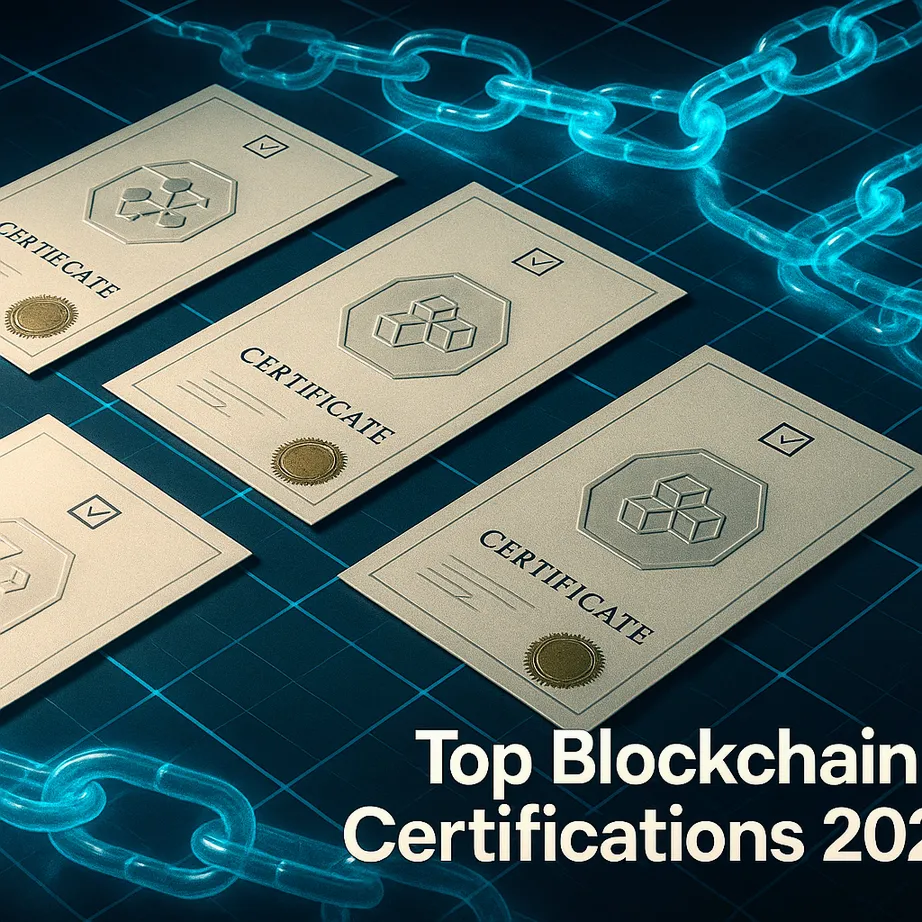If you’re serious about breaking into Web3 or leveling up your career, picking from the top blockchain certifications can feel like stepping into a maze. There’s hype, there’s real value, and then there’s everything in between. The right credential can sharpen your skills, signal credibility to hiring managers, and create a structured path to hands‑on expertise. The wrong one is just another PDF.
This guide cuts through the noise. I’ll show you which certifications are respected by employers, who each is best for, what they cost in time and money, how to study, and how to turn the credential into real opportunities.
Quick picks by career goal
- For developers building smart contracts: ConsenSys Academy Ethereum Developer and Linux Foundation’s Hyperledger Fabric certifications
- For solution architects: Blockchain Training Alliance CBSA
- For enterprise builders and permissioned networks: Linux Foundation Hyperledger Fabric and R3 Corda Certified Developer
- For compliance, AML, and investigations: Chainalysis Reactor Certification
- For security and governance: C4 Certified Bitcoin Professional and CCSS Auditor
- For executives and product leaders: Oxford Blockchain Strategy Programme (certificate of completion)
- For entry-level fundamentals: University of Nicosia MOOC and ISACA Blockchain Fundamentals Certificate
Use these as a map, then dive into the details below.
What hiring managers actually look for
- Skill match to the stack: Ethereum, Solidity, Foundry/Hardhat, Hyperledger Fabric, Corda, or compliance tooling.
- Evidence of build: repos, smart contracts, transactions, or investigative writeups.
- Recognized exam rigor: proctored assessment, practical labs, and maintained curricula.
- Role clarity: dev vs. architect vs. compliance vs. product. Certifications that align with the job description beat generic ones.
Short tail keywords that matter in job posts: blockchain certifications, Ethereum developer, Hyperledger Fabric, Solidity, Corda, AML/crypto compliance, Web3 security.
The Top Blockchain Certifications in Detail
1) Blockchain Training Alliance — Certified Blockchain Solution Architect (CBSA)
- Best for: Solution architects, senior engineers, pre‑sales, and project leads who must translate business requirements into blockchain designs.
- Why it’s valued: Neutral vendor perspective across public and permissioned chains; focuses on architecture trade‑offs (consensus, data models, privacy, security, cost).
- You’ll learn: Use‑case selection, permissioned vs. public architectures, token design, identity, interoperability, and governance.
- Exam vibe: Scenario‑based questions; less coding, more systems thinking.
- ROI: Strong for consultants and architects leading discovery and design workshops.
2) Linux Foundation — Hyperledger Fabric Certifications (CHFD, CHFA)
- Best for: Developers and admins in enterprise/permissioned blockchain settings.
- Why it’s valued: Hyperledger Fabric powers many B2B networks; Linux Foundation exams are respected for depth and regular updates.
- Tracks:
- CHFD (Developer): Chaincode, Fabric SDKs, endorsement policies, events.
- CHFA (Administrator): Network operations, MSPs, ordering service, lifecycle.
- Exam vibe: Hands‑on labs and realistic tasks.
- ROI: High if your org or clients deploy Fabric; often a check‑box in enterprise RFPs.
3) ConsenSys Academy — Ethereum Developer Certification
- Best for: Smart contract developers headed for DeFi, NFTs, or enterprise Ethereum.
- Why it’s valued: ConsenSys is a core Ethereum ecosystem player (MetaMask, Infura); curriculum maps to real dev workflows.
- You’ll learn: Solidity, ERC standards, gas optimization, audits, testing with Foundry or Hardhat, deployment pipelines.
- Exam vibe: Coding assessments and capstone project.
- ROI: Excellent for developer roles where an Ethereum portfolio is king.
4) R3 — Corda Certified Developer
- Best for: Developers in regulated finance, trade finance, and insurance.
- Why it’s valued: Corda is widely used for confidential, regulated workflows.
- You’ll learn: CorDapps, flows, states, contracts, notary services, networks.
- Exam vibe: Project‑style tasks and knowledge checks.
- ROI: Solid for fintech/enterprise roles and consulting engagements.
5) Chainalysis — Reactor Certification (CRC)
- Best for: Compliance analysts, investigators, auditors, and risk teams.
- Why it’s valued: Chainalysis tools are industry‑standard in AML and forensics.
- You’ll learn: On‑chain analytics, tracing, typologies, sanctions screening, case building.
- Exam vibe: Practical investigations in the Reactor interface.
- ROI: Significant in compliance and forensic hiring markets.
6) C4 — Certified Bitcoin Professional (CBP) and CCSS Auditor (CCSSA)
- Best for: Security‑minded professionals, auditors, and anyone handling custody.
- Why it’s valued: C4 focuses on security standards and Bitcoin fundamentals.
- You’ll learn: Bitcoin transactions, wallets, multisig, operational security; CCSS dives into crypto custody controls.
- ROI: Strong for security, audit, and compliance careers; concrete signal of diligence.
7) Oxford Blockchain Strategy Programme (Exec Certificate)
- Best for: Executives, PMs, founders, and product leaders.
- Why it’s valued: Strategy framing, governance, token economics, enterprise adoption.
- Caveat: It’s a certificate of completion, not a proctored certification, but carries brand weight for leadership roles.
8) University of Nicosia — Intro to Digital Currencies (MOOC)
- Best for: Career switchers seeking an entry level blockchain certification path without large upfront cost.
- Why it’s valued: Academic grounding from a pioneering blockchain university; solid fundamentals.
9) IBM Blockchain Developer Certificates
- Best for: Developers entering enterprise tracks and seeking structured labs.
- Why it’s valued: Clear labs, enterprise perspectives, exposure to Fabric‑aligned tooling.
10) ISACA — Blockchain Fundamentals Certificate
- Best for: IT professionals and auditors wanting governance and risk framing.
- Why it’s valued: ISACA recognition across audit and enterprise risk teams.
How to choose the right credential
Use this lightweight decision framework:
- If you want to code smart contracts: prioritize an Ethereum developer certification plus a public repo portfolio.
- If you design systems for enterprises: pick a blockchain architect certification (CBSA) + a permissioned platform cert (Hyperledger or Corda).
- If you work in compliance/forensics: choose Chainalysis CRC or similar accreditation with practical casework.
- If you’re leadership or product: opt for an executive certificate with case studies and governance depth.
Long tail keywords to consider in your search: best blockchain certification for developers, blockchain architect certification, enterprise blockchain certification, Hyperledger Fabric certification exam, Corda certification preparation, blockchain compliance certification.
Costs, time, and realistic ROI
- Time: 40–120 hours for developer or architect tracks; 20–60 hours for fundamentals or compliance.
- Exam style: Proctored multiple choice plus labs is the sweet spot; purely video‑based certificates carry less weight.
- Portfolio impact: Certifications open doors; portfolios close deals. Pair the credential with 2–3 shipped artifacts (contracts, CorDapp, Fabric chaincode, or investigation reports).
- Budget: Expect $300–$1,500 per certification, plus study resources. Some programs offer scholarships or bundle discounts.
A 60‑day study plan that actually works
- Days 1–7: Set your stack. For Ethereum developer certification, install Node.js, Foundry or Hardhat, and connect to a testnet. For Fabric, set up a local network and work through chaincode samples. For compliance, complete vendor fundamentals and review typologies.
- Days 8–21: Build two focused exercises. Examples:
- Ethereum: ERC‑20 with role‑based controls; ERC‑721 with metadata and royalty logic.
- Fabric: Chaincode with endorsement policies and private data collections.
- Corda: Simple CorDapp with states, contracts, and flows.
- Compliance: Trace a ransomware case using public datasets; draft a report.
- Days 22–35: Deepen with testing and security:
- Unit tests, fuzzing, gas profiling, reentrancy protections, access control.
- For Fabric/Corda, performance tests and fault injection.
- For compliance, mock SAR narrative practice and sanctions screening.
- Days 36–49: Take official practice exams and labs. Close gaps with docs and spec reading (ERCs, Fabric lifecycle, Corda flow framework).
- Days 50–60: Full dress rehearsal. Time‑boxed mock exam, polish repo READMEs, and prepare concise architecture or investigation diagrams.
Build a portfolio that proves your certification
- Code repositories with clear READMEs, architecture diagrams, and test coverage.
- A short blog post per project explaining trade‑offs and security measures.
- For compliance: sanitized case studies showing tracing logic, heuristics, and results.
- A demo video walkthrough (3–5 minutes) linked on your resume.
Pro tip: Add a “Certifications and Projects” section to your resume with direct links.
Hands‑on practice with real markets
Understanding on‑chain activity, order books, and fees will make you a sharper developer, analyst, or architect. If you’re new to exchanges, set up an account, use small amounts, and focus on learning.
- Get started here: Join CoinEx with referral code mhz7w
- Keep this handy for friends: referral code mhz7w
Always practice risk management and never trade money you can’t afford to lose. Use testnets where possible for deployment experience.
Common pitfalls to avoid
- Choosing a shiny logo over fit. Pick the credential that matches your target job stack.
- Ignoring hands‑on. Lab‑heavy certifications and real repos beat slideware every time.
- Overpaying for generic content. Verify exam rigor, maintenance cadence, and community standing.
- Skipping fundamentals. Even seasoned engineers benefit from revisiting consensus, cryptography basics, and threat models.
FAQ
- Are blockchain certifications required for jobs? Not strictly, but they can boost interviews and help career switchers signal competence faster.
- What’s the best blockchain certification for developers? An Ethereum developer certification from a respected provider plus a strong portfolio is the most versatile combination.
- How long does prep take? For dev tracks, plan 80–120 hours across 6–8 weeks if you’re new; less if you already ship code.
- Are entry level blockchain certifications worth it? Yes, as a springboard—pair them with a visible project to stand out.
- Which enterprise certifications carry weight? Hyperledger Fabric (Linux Foundation), R3 Corda, and BTA CBSA consistently show up in enterprise RFPs and job posts.
- Can I pivot from compliance to engineering or vice versa? Yes—start with an overlapping domain (smart contract risk for compliance; AML‑aware design for engineers) and layer the second certification later.
Resource shortlist (official and community)
- Linux Foundation Training
- Hyperledger Foundation
- ConsenSys Academy
- Blockchain Training Alliance
- R3 Training
- Chainalysis Training
- C4 Crypto Consortium
- University of Nicosia
Remember: the signal is strongest when your certification, projects, and career story align tightly with the role you want. That’s how top blockchain certifications actually pay off.





